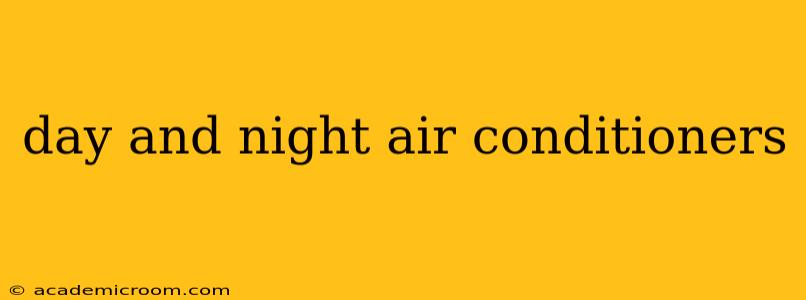Choosing the right air conditioner can significantly impact your comfort and energy bills. While many simply look for cooling power, understanding the nuances of different types, like "day" and "night" air conditioners, is crucial for making an informed decision. This comprehensive guide will delve into the differences, benefits, and considerations to help you choose the best AC for your needs.
Let's clarify a crucial point upfront: There isn't a standardized industry classification of "day" and "night" air conditioners. The terminology often refers to features or operating modes within a single unit, rather than distinct product categories. This guide will unpack those features and how they relate to energy efficiency and usage patterns.
What are the differences between day and night air conditioner modes?
Many modern air conditioners offer customizable settings that allow for optimized performance during different times of the day. These settings often relate to energy consumption and noise levels. "Day" mode typically prioritizes rapid cooling, even if it means higher energy use and potentially louder operation. "Night" mode, conversely, focuses on gentle, quiet cooling while prioritizing energy efficiency. The exact functionality varies by manufacturer and model.
Do day and night air conditioners save energy?
The energy savings associated with "night" modes aren't universally guaranteed. While they often operate at lower power settings, resulting in lower electricity consumption, the overall energy savings depend on several factors:
- Temperature differences: If the temperature difference between inside and outside is significant, the "night" mode might struggle to maintain a comfortable temperature, potentially extending the runtime and negating the energy savings.
- Insulation: A well-insulated home requires less cooling, regardless of the mode, potentially minimizing the differences between "day" and "night" energy consumption.
- Usage habits: Leaving the AC on continuously in "night" mode may still consume more energy than strategically using "day" mode for shorter periods during peak heat.
What is the difference between day and night operation on an inverter AC?
Inverter air conditioners provide a smoother and more energy-efficient cooling experience compared to traditional on/off units. The "day" and "night" modes on an inverter AC will still adjust the compressor speed, but the differences might be more subtle. "Night" mode will likely prioritize quieter operation at a lower compressor speed, resulting in gentler cooling and reduced energy consumption, while "day" mode allows for faster cooling at higher compressor speeds.
Are there any special features for day and night usage?
Many AC units, regardless of specific "day" or "night" modes, offer features beneficial for both times of day:
- Sleep timers: These allow you to program the AC to turn off automatically after a set time, preventing wasted energy during periods of inactivity.
- Smart home integration: Smart ACs can learn your preferences and adjust settings automatically based on your schedule and occupancy.
- Variable fan speeds: This allows you to customize airflow and noise levels to suit the time of day and your comfort level.
How to choose the right air conditioner for your needs?
Choosing the right air conditioner depends on several factors beyond "day" and "night" modes:
- Room size: Select an AC with the appropriate cooling capacity (BTUs) to effectively cool the space.
- Energy efficiency rating (SEER): A higher SEER rating indicates greater energy efficiency, potentially translating to lower electricity bills.
- Budget: Air conditioners range in price, and you should consider factors like installation and maintenance costs in addition to the initial purchase price.
- Features: Determine which features, like smart home compatibility, sleep timers, and variable fan speeds, are most important to you.
Conclusion
While the terms "day" and "night" air conditioners aren't strictly defined categories, they highlight the importance of considering how your AC operates at different times of the day. By understanding the nuances of different modes and features, you can make an informed choice to maximize comfort and minimize energy consumption. Remember to prioritize factors like room size, energy efficiency, and budget when selecting an AC unit to ensure optimal performance and value for your money.
